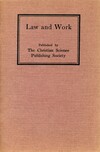

Are you sure?
This bookmark will be removed from all folders and any saved notes will be permanently removed.
Among the many incidental services which Christian Science...
The Christian Science Monitor
Among the many incidental services which Christian Science is bestowing on humanity is that it is steadily raising up a great race of exact thinkers. In Christian Science there is no room for such a phrase as "near enough." No human being can be too near to God; and consequently no human being can ever reason too exactly or too closely to Truth. Speaking one day to the Jews, in the court of the women in the temple, Jesus said, referring to those "which believed on him," "Ye shall know the truth, and the truth shall make you free." Readers familiar with the text of the Fourth Gospel are aware that the writer, with that precision of phrase which is so characteristic of his work, separates the absolute from the relative by a use of the definite article, a distinction which is unfortunately lost in the translation. "The freedom of the individual," writes one of the most brilliant of English commentators, with that deep insight for which he was justly famous, "is perfect conformity to the absolute—to that which is. Intellectually this conformity is knowledge of the truth: morally, obedience to the divine law."
It was precisely because Jesus had this knowledge of Truth, because in thought and deed he lived in absolute conformity to the absolute, that the synoptists say of him that "he taught them as one having authority, and not as the scribes." The word here translated authority is exousia, and it is noticeable that it is almost indifferently translated authority or power. This is remarkable, for the king de facto and the king de jure are by no means necessarily identical, and it proves that, in the mind of the writer, knowledge of the absolute, expressed intellectually in conformity to the truth and morally in obedience to divine law, constituted at once authority and power. "Honesty," writes Mrs. Eddy on page 453 of Science and Health, "is spiritual power."
Exactly what this means is brought out in the most striking way in the Fourth Gospel. After one of the many occasions on which Pilate, issuing from the prætorium, had faced the populace outside, he returned into the judgment-hall, and with the cry, "He made himself the Son of God," ringing in his ears, inquired of Jesus, "Whence art thou?" It was then, astonished by the silence with which his question was received, he demanded, "Speakest thou not unto me? knowest thou not that I have power to crucify thee, and have power to release thee?" The claim of Pilate, made with all the brutal frankness of the Roman soldier, to dispose as he chose of the life of the prisoner before him, Jesus brushed aside in a single sentence which set authority in its true light: "Thou couldest have no power at all against me, except it were given thee from above." The man who had avoided the manifold pitfalls set for him by the scribes and Pharisees, could have escaped now the craftiness of the high priests and the blundering Roman governor. If he seemed caught within their toils, it was only because his clear perception of the working of divine law seemed to show him that the moment had come when he could prove to humanity that life was indestructible and Spirit not to be held within the grasp of matter.
Enjoy 1 free Sentinel article or audio program each month, including content from 1898 to today.
JSH Collections
This article is included in:
1916 - PAMPHLET
Law and work
JSH-Online has hundreds of pamphlets, anthologies, and special editions for you to discover.

May 21, 1910 issue
View Issue-
THE OPTIMISM OF THE SCRIPTURES
SUE HARPER MIMS.
-
APPEARANCE VS. REALITY
JOHN E. FELLERS.
-
SALVATION HATH GOD ORDAINED
ELIZABETH EARL JONES.
-
CHRISTIAN SCIENCE HEALING
WILLIAM LLOYD.
-
"POSSESSIONS."
HENRIETTA MARCUS.
-
"OUT OF THE DEPTHS."
CHARLES H. S. KING.
-
REFLECTION
FLORENCE LOUISE FRANK.
-
Among the many incidental services which Christian Science...
Frederick Dixon
-
Christian Science establishes its claim to be the Christmethod...
Nellie M. Johnson
-
Our critic is wrong in his assumption regarding the teaching...
George Shaw Cook
-
PRAISE
R. E. KEY.
-
MRS. EDDY TAKES NO PATIENTS
Editor
-
MRS. EDDY HELPS LITERARY UNION
Editor with contributions from Henry B. Quinby, Ellen A. Wallace
-
PERSISTENCY
Annie M. Knott
-
THE LINE OF LEAST RESISTANCE
John B. Willis
-
LETTERS TO OUR LEADER
with contributions from Etta Prince Williams, Mary Baker Eddy, Leila Close Harsch, Mabel C. Dyer, Ida Kate Schultze, Harvey M. Ferris, Clara S. Hill, Tunis H. Cropsey, Ella Peck Sweet, Charles McVean Cameron, Frances Mack Mann, Martha B. Prell
-
THE LECTURES
with contributions from Thomas W. Morgan, Roy Jones
-
It is with gladness and gratitude that I testify to the...
Annie. P. Stone
-
Years ago, while taking a course in Bible study, I read...
Florence Goucher
-
For a long time I have felt it my duty to express my...
Orlando P. Brunson
-
For the manifold blessings I have received in Christian Science...
Delia Richardson
-
About two years ago I was greatly benefited by the...
Mattie A. Howell
-
Two years ago my attention was directed to Christian Science...
Emma Galloway Craft
-
About eighteen years ago, Christian Science came to...
Leila Backlin French
-
It is with deep gratitude to God, and to Mrs. Eddy for...
Louise A. Slusser
-
A PROMISE
GERTRUDE RING HOMANS
-
FROM OUR EXCHANGES
Lyman Abbott


